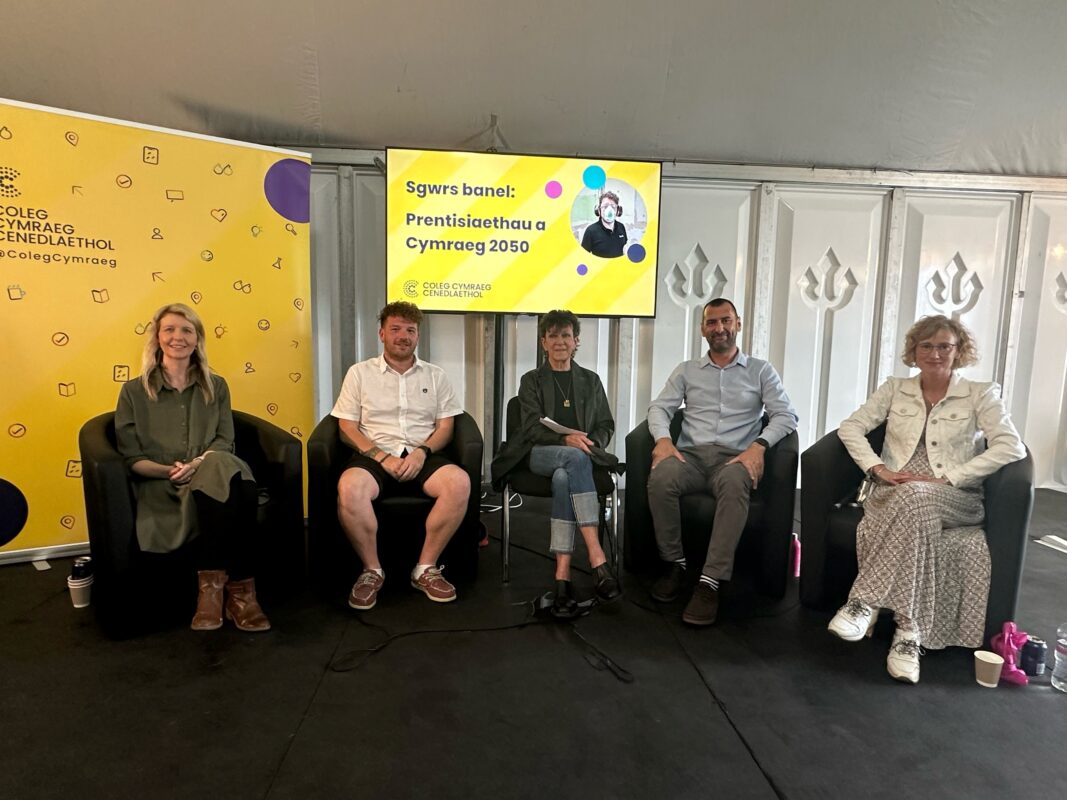Increase in bilingual apprenticeships.

The number of apprentices following a bilingual course has more than doubled since the Coleg Cymraeg Cenedlaethol began working in the sector, with the number of learning activities increasing from 10% in 2016 to over 25% in 2022. That increase is most apparent among apprentices who do elements of their apprenticeship bilingually.
The Coleg Cymraeg has supported a number of strategic projects with 51 grants being awarded to colleges and 11 grants to apprenticeship providers during the 2022/2023 academic year.
In addition to the grants that have enabled colleges and apprenticeship providers to employ Welsh speaking staff, the Coleg Cymraeg has developed several learning resources including the Fferm Ddiogel (farm safety) V.R resource and an interactive resource to improve apprentices’ understanding of bilingualism in the workplace.
One of the most popular resources to be developed and presented to the apprenticeship sector by the Coleg Cymraeg is the Prentis-Iaith resource. The aim is to raise awareness of the Welsh language on four levels – awareness, understanding, confidence and fluency – to all apprentices in the sector.
Jasmin Davies-Kumar from Llandeilo is one of the apprentices who has completed the Prentis-Iaith course. She is doing an apprenticeship in Clinical Healthcare at Pembrokeshire College and her training at Glangwili Hospital in Carmarthen.
Jasmin said,
“Thanks to the Coleg Cymraeg, I can now work bilingually in Welsh and English. But more importantly, I have seen the difference that being able to speak both languages makes to patients at the hospital.
“Many of the patients here speak Welsh, and from my experience, vulnerable people and children in particular, prefer to speak their mother tongue. When a patient hears a nurse speak Welsh, they immediately feel more comfortable and because of this, I have been able to develop a close relationship with my patients.
“I would encourage anyone, whatever their level of Welsh, to study part of their apprenticeship in Welsh.
“You’ll get the skills needed to work bilingually, and even using a little bit of Welsh goes a long way.”
The Coleg Cymraeg has also introduced an ambassador scheme for the post-16 sector, offered training to tutors to increase their Welsh-medium provision and introduced schemes to raise confidence speaking Welsh.
Dr Lowri Morgans, Senior Manager of Further Education and Apprenticeships at the Coleg Cymraeg Cenedlaethol said,
“We are very proud of the work we have done in the post-16 sector to ensure that apprentices have more opportunities to study bilingually.
“Our projects have been focusing on the priority areas of health and care, childcare, public services, sport, business and creative industries and land studies. As a result, we have established a solid infrastructure for the provision and increased the number of bilingual learning activities.”
At this year’s Rhondda Cynon Taf National Eisteddfod, the Coleg Cymraeg will hold an event to discuss these developments and the difference it has made to apprentices.
The event, ‘Apprenticeships and Cymraeg 2050’, was held in Pabell y Cymdeithasau on the Eisteddfod field, Monday, 5 August at 1pm.











Responses